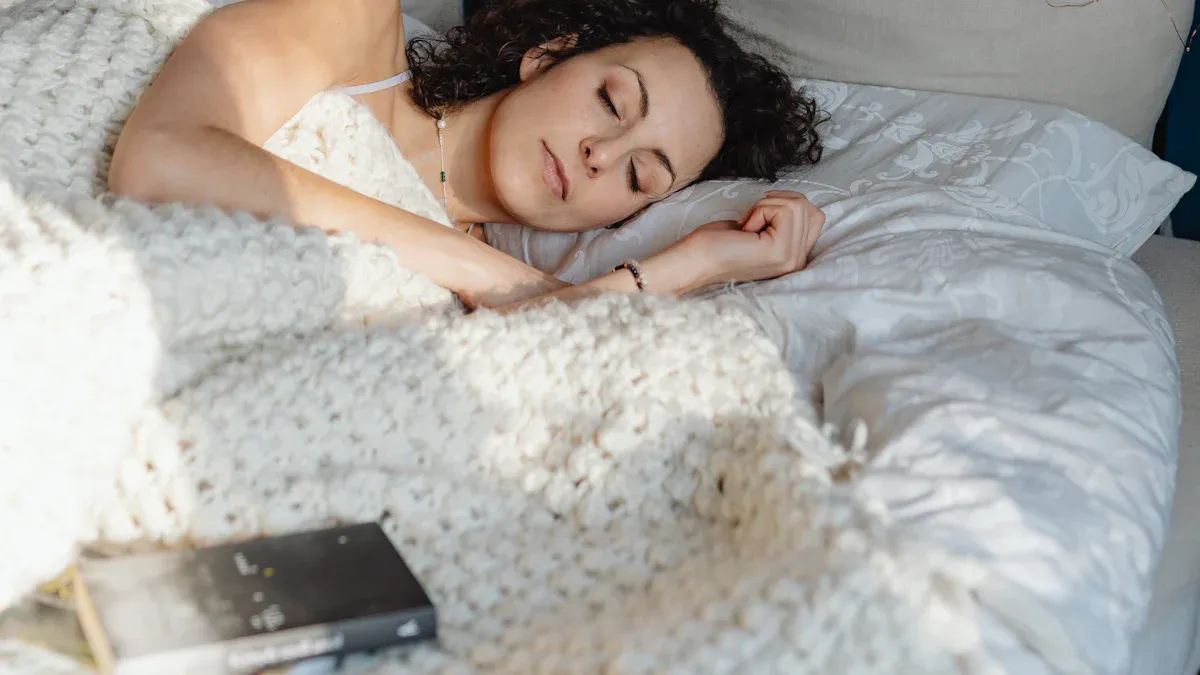
Do you ever feel like your sleep is all over the place? You’re not alone. Nearly one in three adults doesn’t get enough rest, and more than 30% report symptoms of insomnia every year. Poor sleep doesn’t just leave you feeling tired—it can affect your mental health, memory, and even increase risks for heart disease or diabetes. Wondering how to fix your sleep schedule? The good news is that you can get back on track by sticking to a consistent routine and making small, impactful changes. Tools like a sleep tracking ring can also provide valuable insights into your patterns, helping you take control and feel more energized every day.
Key Takeaways
-
Wake up at the same time every day. This helps your body get used to a routine and improves sleep.
-
Change your bedtime slowly by 15-30 minutes each night. Small steps make it easier for your body to adjust.
-
Have a calming bedtime routine. Doing things like reading or light stretching tells your body it’s time to relax.
-
Stay off screens before bed. Less blue light helps your brain get ready to sleep.
-
Make your bedroom good for sleeping. Keep it dark, quiet, and cool for better rest.
Why Your Sleep Schedule is Off Track
Irregular Sleep Patterns
Your body works best with a steady routine. Changing sleep times confuses your internal clock, called the circadian rhythm. This clock tells you when to sleep and wake up. If your sleep schedule keeps changing, your body struggles to adjust. This can lead to health problems. For instance, studies show irregular sleep raises risks for obesity and high blood pressure. Each hour of change in sleep timing can increase these risks by 27%.
People with irregular sleep often take naps during the day. These naps make it harder for their bodies to stay on track. Research shows irregular sleepers nap over three times a week, while regular sleepers nap less than once. They also go to bed and wake up later, which further confuses their internal clock.
Overuse of Screens Before Bed
Do you use your phone or watch TV before bed? Many people do, but it can harm your sleep. Screens give off blue light, which tricks your brain into thinking it’s daytime. This stops melatonin, the hormone that helps you sleep, from working. Studies show poor sleepers spend about 152 minutes on screens before bed, while better sleepers spend 137 minutes.
Using screens doesn’t just delay sleep—it also makes it worse. Research links screen time to poor sleep quality. About 12.7% of bad sleep can be blamed on screen use.
Stress and Anxiety
Stress and anxiety are big reasons people can’t sleep well. When you’re worried, it’s hard to relax and fall asleep. Stress raises cortisol, a hormone that keeps you awake. Anxiety makes you notice every sound or feeling, keeping you alert. Studies show stressed people are 79% more likely to sleep poorly. Anxiety doubles the chance of having sleep problems.
Students and workers often feel extra pressure, which worsens sleep. For example, nursing students are twice as likely to have bad sleep because of stress. If you’ve ever stayed awake worrying about tests or work, you know how tough it is to stop the cycle.
Poor Sleep Environment
Your bedroom affects how well you sleep. If it’s noisy, bright, or uncomfortable, relaxing becomes harder. These distractions can confuse your body’s natural sleep clock. For example, street noise or bright lights can keep your brain alert, making it tough to fall asleep.
Studies show bad environments lead to shorter, poorer sleep. Things like unsafe neighborhoods, lack of green spaces, or busy streets can affect rest. People in noisy or bright areas often have more trouble sleeping. These issues make it harder to control your sleep, which worsens the problem.
You can improve your sleep space with small changes. Use blackout curtains to block light. Try a white noise machine or lower your room’s temperature. Even tidying up your room or adding soft colors can help you sleep better.
Lifestyle Factors (e.g., caffeine, late-night meals)
What you eat or drink before bed matters. Caffeine is a problem because it keeps you awake. Coffee or tea in the evening can stop you from getting deep sleep. This messes up your sleep schedule and makes you tired the next day.
Eating late at night can also hurt your sleep. Heavy or spicy foods can cause stomach problems, making it hard to relax. Your body needs time to digest, so eating too late keeps it active when it should be resting.
To fix this, avoid caffeine after lunch and eat dinner earlier. If you’re hungry before bed, choose a light snack like a banana or nuts. These small steps can help your body stick to its natural sleep rhythm.
How to Fix Sleep Schedule with Simple Tips
Set a Consistent Wake-Up Time
A great way to fix your sleep is waking up at the same time daily. This habit helps your circadian rhythm stay steady, making it easier to sleep and wake naturally. Even on weekends, try to wake up at the same time. It might feel hard at first, but your body will adjust.
A study of 23 young adults showed that keeping a steady wake-up time led to earlier bedtimes and better alignment with their internal clocks. While their total sleep time didn’t change, their sleep patterns improved. This proves how helpful a consistent wake-up time can be.
Here’s how to start:
-
Set an alarm: Use a soft alarm sound to wake up daily.
-
Don’t hit snooze: Getting up right away helps your body adapt faster.
-
Move around: Stretching or drinking water can help you wake up fully.
By waking up at the same time every day, you’ll build a strong base for better sleep.
Gradually Adjust Your Bedtime
If your bedtime feels off, don’t change it all at once. Instead, adjust it slowly. Move your bedtime earlier or later by 15–30 minutes each night. This makes it easier for your body to adapt.
Research supports this method. Studies show that small changes, along with light and dark exposure, can reset your circadian rhythm. This approach also improves mental health and daytime focus for night owls.
|
Findings |
|
|---|---|
|
The effects of chronotype, sleep schedule and light/dark pattern exposures on circadian phase |
Light exposure helps align sleep schedules with the circadian rhythm. |
|
Resetting the late timing of ‘night owls’ has a positive impact on mental health and performance |
Gradual bedtime changes improve mental health and cognitive function. |
|
Personalized sleep-wake patterns aligned with circadian rhythm relieve daytime sleepiness |
Adjusting sleep patterns reduces daytime fatigue. |
To try this:
-
Pick your ideal bedtime.
-
Adjust your current bedtime by 15–30 minutes each night until you reach your goal.
-
Skip naps during the day, as they can mess up your progress.
This slow method helps your body match its natural sleep rhythm.
Create a Relaxing Bedtime Routine
A calming routine before bed tells your body it’s time to relax. This helps you shift from a busy day to a peaceful night, making it easier to fall asleep.
Studies show bedtime routines work well, especially for kids. Activities like a warm bath, reading, or relaxing exercises help people fall asleep faster and wake up less during the night. While these studies focus on children, adults can benefit too.
|
Description |
|
|---|---|
|
Earlier Bedtime |
A routine helps you go to bed earlier. |
|
Decreased Sleep Onset Latency |
You’ll fall asleep faster with a consistent routine. |
|
Reduced Nighttime Awakenings |
A calming routine leads to fewer disruptions during the night. |
|
Increased Sleep Duration |
You’ll enjoy longer, more restful sleep. |
|
Enhanced Caregiver-Reported Sleep Quality |
Caregivers report better sleep quality in children with a bedtime routine. |
Here are some tips for your bedtime routine:
-
Dim the lights: Lowering lights helps your body make melatonin.
-
Relax your body: Try deep breathing or light stretches to calm down.
-
Avoid exciting activities: Skip hard workouts or stressful talks before bed.
By following a bedtime routine, you’ll create better habits and improve your sleep schedule.
Limit Screen Time Before Bed
Do you use your phone or watch TV before bed? It might seem harmless, but it can hurt your sleep. Devices like phones and TVs give off blue light. This light tricks your brain into thinking it’s still daytime. As a result, your body stops making melatonin, the hormone that helps you sleep.
Studies show that cutting back on screen time helps improve sleep. Check out these findings:
|
Study Description |
Findings |
Impact on Sleep |
|---|---|---|
|
Youth screen media habits and sleep |
Negative impact on sleep quality and duration |
|
|
Intervention with sleep hygiene program |
Regular bedtimes after sleep hygiene classes |
Modest benefits in sleep quality and duration |
|
FERRET sleep hygiene program |
Better sleep hygiene scores |
No major change in sleep duration |
|
Mobile phone restriction intervention |
Earlier ‘lights out' and longer sleep time |
Positive impact on sleep duration |
Here’s how to reduce screen time before bed:
-
Set a screen curfew: Turn off devices at least one hour before bed.
-
Use blue light filters: If needed, turn on night mode or blue light filters.
-
Try relaxing activities: Read a book, write in a journal, or meditate instead.
By using less screen time, your brain can relax naturally. This makes it easier to fall asleep and stay asleep.
Optimize Your Sleep Environment
Your bedroom affects how well you sleep. A noisy, bright, or messy room can make it hard to relax. But a calm and cozy space helps you fall asleep faster and stay asleep longer.
Research shows that your surroundings impact your sleep quality. Clean and quiet areas help you feel calm and improve rest. A peaceful space lowers stress and creates the perfect place for sleep.
Here’s how to make your bedroom better for sleep:
-
Keep it dark: Use blackout curtains or wear an eye mask.
-
Reduce noise: Use earplugs or a white noise machine to block sounds.
-
Control the temperature: Keep your room cool, around 60–67°F.
-
Tidy up: A clean room feels more relaxing and inviting.
Small changes, like soft bedding or calming colors, can help too. When your room feels peaceful, your body will know it’s time to rest.
Avoid Stimulants in the Evening
What you eat or drink at night can affect your sleep. Drinks like coffee or tea have caffeine, which keeps your brain awake. Even a cup in the afternoon can make it harder to sleep later.
Here are some tips to avoid stimulants and sleep better:
-
Skip sodas, energy drinks, or chocolate in the evening.
-
Avoid nicotine, as it delays sleep and lowers sleep quality.
Instead of caffeine, try herbal tea or warm milk before bed. These small changes help your body relax and prepare for sleep. You’ll fall asleep faster and wake up feeling more rested.
Get Morning Sunlight Exposure
Did you know morning sunlight can help fix your sleep? Going outside early helps reset your body’s internal clock, called the circadian rhythm. This light tells your body it’s time to wake up and be active. It also makes falling asleep at night easier.
Even a little sunlight in the morning can help a lot. Here’s what research says:
|
Key Findings |
Description |
|---|---|
|
Phase Shift |
Morning light changes your circadian rhythm significantly. |
|
Effectiveness |
|
|
Timing Importance |
Early sunlight works best, especially near the phase advance peak. |
|
Key Findings |
Description |
|---|---|
|
Sleep Quality |
Morning sunlight helps you fall asleep faster and sleep longer. |
|
Circadian Synchronization |
Timing sunlight exposure is more important than how long you stay outside. |
|
Sleep Efficiency |
Morning light improves sleep cycles and makes sleep more effective. |
Here’s how to get morning sunlight:
-
Go outside early: Spend 20–30 minutes in sunlight within an hour of waking.
-
Open your curtains: Let sunlight brighten your room as soon as you wake up.
-
Move outdoors: Take a short walk or stretch outside to boost the benefits.
Getting sunlight in the morning helps you feel awake during the day and sleep better at night. 🌞
Use Sleep Aids Sparingly (e.g., melatonin)
Sometimes, you might think about using sleep aids like melatonin to fix your sleep. These can help for a short time, but they shouldn’t be a long-term solution. Melatonin is a hormone your body makes naturally to control sleep. Taking it as a supplement should only be for temporary use.
Here’s what studies say about melatonin:
|
Evidence Type |
Findings |
|---|---|
|
Safety Profile |
Melatonin is safe with few side effects. |
|
Efficacy |
It can add 12.8 minutes to sleep time and reduce time to fall asleep by 4 minutes. |
|
Dosage Variability |
Effects depend on dose; higher doses may cause mild side effects. |
|
Dependence Risk |
Very low chance of dependence or withdrawal symptoms. |
|
Adverse Effects |
Doses over 10mg/day may cause headaches or drowsiness. |
If you want to try melatonin:
-
Start small: Use 1–3 mg about 30 minutes before bed.
-
Don’t overuse: Only use it for short periods, like adjusting to a new time zone.
-
Ask a doctor: If sleep problems continue, talk to a healthcare provider.
Melatonin works best with good sleep habits. Think of it as a small helper, not a permanent fix.
Stay Active During the Day
Being active during the day helps you sleep better at night. Exercise makes your body naturally tired, so it’s easier to fall asleep and stay asleep.
Studies show how exercise improves sleep:
-
Over 2,500 people who exercised regularly had fewer sleep problems and felt less tired.
-
Older adults who did moderate exercise three times a week slept better after 12 weeks.
-
Students who stayed active during free time reported better sleep than those who didn’t.
Here’s how to add movement to your day:
-
Take a walk: A 20–30 minute brisk walk can improve your sleep.
-
Do yoga or stretch: These activities relax your body and prepare it for rest.
-
Avoid late workouts: Exercise earlier in the day to avoid staying too energized at night.
You don’t need to go to the gym every day. Fun activities like dancing, gardening, or playing with your pet can help too. Just keep moving, and your body will thank you with better sleep. 🏃♀️
How Long Will It Take to See Results?

Factors That Influence the Timeline
Fixing your sleep schedule can take different amounts of time. Age is important because sleep changes as you grow older. Older people may need more time to adjust their sleep patterns. If your sleep has been irregular lately, resetting your circadian rhythm might take longer.
Other things, like drinking alcohol or having sleep problems, can slow progress. Alcohol messes up your sleep cycle by reducing REM sleep at first and causing issues later. Sleep disorders like sleep apnea or restless legs syndrome make it harder to get good sleep regularly.
|
Factor |
Description |
|---|---|
|
Age |
Sleep stages change with age, affecting REM sleep levels. |
|
Recent sleep patterns |
Irregular sleep makes it harder to fix your sleep cycle. |
|
Alcohol |
Lowers REM sleep early on but causes problems later. |
|
Sleep disorders |
Issues like sleep apnea disrupt normal sleep cycles. |
Typical Timeframes for Improvement
You might wonder how fast you’ll see changes. Studies show improvements can happen in weeks, but lasting results may take months.
-
Sleep increased by 8 to 45 minutes per night in some studies.
-
Combining sleep tips with changes at home helped people improve sleep for up to 2 years.
-
Later school start times gave students 1.39 extra hours of sleep compared to earlier schedules.
Short-term progress is possible, but staying consistent is key for long-term success.
Tips for Staying Consistent
Being consistent helps fix your sleep schedule faster. Regular bedtimes and wake-up times keep your circadian rhythm steady. This improves sleep quality and overall health.
Tip: Stick to your sleep schedule every day, even on weekends. Changing it can undo progress and make it harder to stay on track.
Research shows regular sleep routines lower risks for health problems like heart disease. A review found that steady sleep patterns improve life quality.
To stay consistent:
-
Use alarms for bedtime and wake-up time.
-
Skip naps during the day.
-
Track your sleep with tools like the Aura Ring to see your progress.
By staying focused, you’ll enjoy better sleep and feel healthier. 🌙
Fixing your sleep schedule takes time, but it’s worth it. Healthy habits can improve your energy, mood, and health. A steady sleep routine helps you feel rested and stay healthier.
|
Benefit Type |
What It Helps With |
|---|---|
|
Physical Health |
Better sleep strengthens your immune system and aids digestion. |
|
Mental Health |
Regular sleep improves focus, mood, and lowers anxiety for clearer thinking. |
|
Performance |
Studies show good sleep boosts brain power and productivity. |
Start with small changes, stay steady, and enjoy better sleep. 🌙
FAQ
How can I track my sleep schedule effectively?
You can use tools like the Aura Ring by VERTU. It monitors your sleep patterns and provides personalized insights. This helps you understand your habits and make adjustments. You’ll get weekly wellness reports that simplify tracking and improve your sleep routine.
Is it okay to sleep in on weekends?
Sleeping in disrupts your circadian rhythm. Try waking up at the same time every day, even on weekends. This consistency helps your body stay on track and makes falling asleep easier at night.
What’s the best way to fall asleep faster?
Create a relaxing bedtime routine. Dim the lights, stretch lightly, or read a calming book. Avoid screens and caffeine before bed. These small changes signal your body that it’s time to rest.
Can morning sunlight really improve sleep?
Yes! Morning sunlight resets your internal clock. Spend 20–30 minutes outside early in the day. This boosts your energy and helps you sleep better at night. Open your curtains or take a short walk to soak in the benefits. 🌞
Should I use melatonin to fix my sleep schedule?
Melatonin can help temporarily, but it’s not a long-term solution. Start with a small dose, like 1–3 mg, and use it sparingly. Pair it with healthy sleep habits for the best results.








